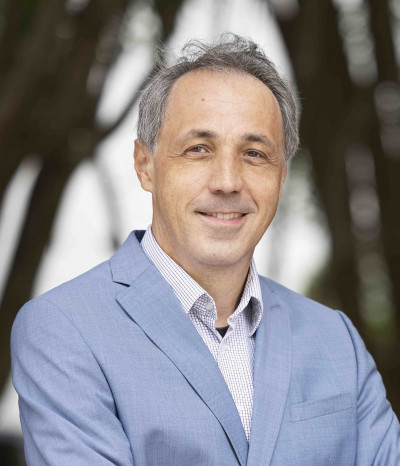 |
|
Patrick Achenbach
Patrick Achenbach studied physics and mathematics at Justus Liebig University in Giessen, Germany. He worked on the H1 inclusive deep inelastic scattering experiments
at Germany's largest accelerator center DESY as a student, and for his physics diploma in the A2 and TAPS Collaborations at the Mainz Microtron electron accelerator MAMI,
studying nucleon resonances and meson photoproduction reactions. He earned a doctorate at Johannes Gutenberg University in Mainz, Germany, preparing and carrying out a
parity-violating elastic electron scattering experiment within the A4 Collaboration at MAMI to access the nucleon strangeness form factors. From 2000 to 2002 he conducted
his postdoctoral research at the University of Oxford, England, where he was involved in cosmic ray and atmospheric neutrino science.
Patrick worked for many years within the A1 Collaboration at MAMI on strangeness production, hadron spectroscopy, and hypernuclei. In the last years, he was
preparing light dark matter search experiments at the MESA accelerator under construction in Mainz. He has a strong background in the operation of experiments and experimental
equipment, with a focus on electron beam and spectrometer facilities. Since 2009, he has been engaged in research at Jefferson Lab.
He has published more than 200 peer-reviewed articles in the field of particle, hadron, and nuclear physics. He is also a presenter comfortable on the
international stage who has given numerous talks at scientific events.
Before coming to Jefferson Lab, Patrick was a Professor of Experimental Physics at the Johannes Gutenberg University. He has also served or is serving on the
Japan Proton Accelerator Research Complex (J-PARC) Program Advisory Committee and on several Executive & Collaboration Boards, Steering and Collaboration Management Committees.
Moreover, he has links to the Research Center for Electron Photon Science in Sendai, Japan, the GSI Helmholtz Centre for Heavy Ion Research near Darmstadt, Germany, and the
Facility for Antiproton and Ion Research FAIR at the same place.
Current Responsibilities in Hall B:
- Hall B Leader, responsible for the staging and execution of the scientific experiments and for the further development of the research program through collaboration with
users, staff, and advisory committees.
|

